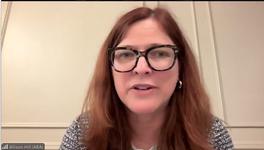
In a turbulent time, "the vitality of independent bookstores was undeniable in 2024," Allison Hill, CEO of the American Booksellers Association, said at the ABA's annual meeting yesterday. The ABA's membership grew nearly 18%. As of May 15, 3,281 locations are operated by 2,863 member companies--almost doubling in the past five years. Altogether, 314 bookstore businesses opened in 2024, of which 60 were BIPOC-owned and 21 Black-owned. The majority of the new businesses have storefronts; other formats include online, mobile, and pop-up stores. This marked the fourth year in a row that more than 200 bookstores opened. Thirty-seven bookstores closed in 2024, and 81 have opened so far this year. Another 274 provisional members are in the process of or considering opening a bookstore.
Hill emphasized that this growth has been occurring "despite significant challenges: the usual ones like thin margins, rising costs, and Amazon's chokehold on our industry, and more urgent threats that shook the very foundation of your work as the right to read and access books faced sustained, coordinated attacks."

|
|
| Allison Hill | |
Related to that, the ABA doubled its free expression team, "created a hotline for members facing harassment, published The Right to Read Handbook, and offered essential sessions to equip members with the tools and resources needed to defend their right to free expression."
The association also had the largest Winter Institute and Children's Institute in history, and the most successful Independent Bookstore Day. Among other things, the organization put a focus on financial matters, conducting cash flow sessions at the regional association shows as well as financial literacy education and individual financial counseling.
Hill added that the ABA delivered on its mission--to help independent bookstores survive and thrive--"with financial responsibility, staying on budget and receiving a clean audit."
New president Cynthia Compton of 4 Kids Books & Toys, Zionsville, Ind., and MacArthur Books, Carmel, Ind., who has been treasurer, gave the 2024 financial report, noting that operating revenue for fiscal year 2024 was $7.6 million and expenses were $9.3 million. The ABA ended the year ahead of budget and received a clean audit report, she continued. The association's ratio of programming expenses to administrative expenses was 75:23, better than the benchmark of 70:30. The ABA draws from its investment portfolio, currently at $26.5 million, to help fund its operations; about 20% of revenue comes from membership.
Outgoing ABA president Tegan Tigani of Queen Anne Book Company, Seattle, Wash., called the past year "challenging. The turnover on our board mirrors turnover many of us are seeing in our stores; our industry is experiencing high rates of burnout and churn. While our hearts and imaginations are limitless, our time, energy, and resources are constrained. The country has literally and figuratively been on fire, and the state of constant emergencies has taken a toll. As Cynthia said in a recent conversation, 'everyone in this room is doing way more with way less.'
"When I catch up with booksellers across the country, I see that we are weary. Whether from reworking a school order to fit the parameters of a new budget; from testifying (or merely waiting to testify) in the Texas House or before Congress in D.C.; from unpacking shipments and repacking damages; from training new booksellers and taking on extra shifts; from hosting events; from serving on committees or panels or the board to help keep our industry strong; from cleaning up the neighborhood after a flood, a fire, a tornado, or a blizzard; from spending extra time on the phone with a customer who needs a friendly voice; or from any of other the ways, big and small, that booksellers care for each other and our communities--we are tired. But I also see that we are determined, and we are strong."
Noting that Allison Hill recently marked her fifth anniversary as ABA CEO, Tigani thanked her for all her efforts on behalf of the association and its members, saying, "Allison has provided our organization with vision, structure, teamwork, and momentum that have allowed ABA to deal with current challenges and to anticipate future ones. Her focus on the ABCs (ABACUS, Batch, and Counting our sales) is helping us prove our impact and improve our performance. She effectively leads a committed and growing staff of all-stars distributed around the country. She maintains impactful partnerships with organizations like Media Coalition, PEN, the League of Women Voters, Authors Against Book Bans, Bookshop, and more."
Tigani and Hill also thanked board members who left during the year or whose terms are ending, including Jenny Cohen, Jeff Deutsch, Danny Caine, and Kathy Burnette. She welcomed new president Cynthia Compton, and co-vice presidents Jake Cumsky-Whitlock of Solid State Books, Washington, D.C., and Diane Capriola of Little Shop of Stories, Decatur, Ga., as well as new board members Brein Lopez of Children's Book World, Los Angeles, Calif.; Talia Whyte of Rozzie Bound Co-op, Boston, Mass.; and Paul Hanson of Village Books, Bellingham and Lynden, Wash.
And Tigani noted "a bittersweet milestone": the retirement this coming August of ABA CFO PK Sindwani, whose "reporting has been a miracle of clarity, which on its own is enough to make a board eternally grateful. But he contributes to every board meeting well beyond spreadsheets and graphs."
For her part, Hill thanked Tigani for "her compassionate and dedicated leadership that was extraordinary." Hill thanked the ABA staff, too, and observed, "In a world increasingly driven by billionaires and algorithms--and in an industry threatened by the politicization of books--the passion, purpose, and authenticity of independent bookstores matter more than ever. We are honored to serve and support you in this vital work." --John Mutter
Community Forum
Reiko Redmonde of Revolution Books in Berkeley, Calif., called for the ABA to "speak out and take a stand" against the ongoing rise of fascism in the U.S. and shared parts of a statement written in support of Palestinian poet and writer Mosab Abu Toha. Redmonde invited other ABA members, as well as the organization itself, to sign the statement.
 |
|
| Cynthia Compton | |
In response, Compton referred to the statement issued by the board in Bookselling This Week on March 6, and reiterated the ABA's condemnation of all attacks on bookstores, particularly on those that have chosen to highlight Palestinian books and authors, and the organization's belief that all "stores have the right to stock, staff, promote and host authors and ideas that they believe in." Hill acknowledged the Palestinian voices that are being silenced and the activists who are being punished, and she noted that booksellers are an "incredibly powerful" force in the fight against rising fascism.
Prior to the community forum, the board had received a number of letters from booksellers regarding its and the ABA's stance on Palestine. Compton noted that the board has received "a tremendous amount of feedback" from members. It has been varied, with some members wanting the board to make a statement "on one side or another" and others wanting there to be no statement at all. Ultimately, she said, the board has elected to let the work it does supporting stores on the ground "speak for us."
Asked how tariffs will affect book prices, Hill said that the "short answer" is that it remains to be seen. The ABA has completed most of its annual meetings with publishers and the responses "have been mixed." There is a lot of concern about consumer confidence and how rising prices will affect consumers, and some publishers, particularly those with significant nonbook revenue, have been impacted more than others. Some publishers are anticipating rising costs due tariffs on things like ink, while others are in a "wait and see mode" and intend to absorb costs in the short term. Overall, Hill remarked, the ABA got the impression that publishers are aware that the industry is up against a "willingness to pay," with the question being "how much more can you charge for a book before you see a decline in sales?" Rising prices would also have significant impacts on access to books.
Compton added that one of her bookstores, which is a children's store, has already been impacted "really significantly," particularly by the tariff costs on toys. The continued uncertainty is making it "very, very hard to plan for Q3" and is forcing her to "rethink almost everything I'm doing in that particular store this year."
Board member Brein Lopez discussed the ongoing processing of migrating bookstores to Indiecommerce 2.0 and stressed that Indiecommerce 1.0 will eventually be discontinued. He encouraged booksellers who have not yet migrated to 2.0 to reach out to the ABA and start that process. Hill could not give an exact date of when Indiecommerce 1.0 will go away, but she said the ABA would ideally like to migrate everyone "before the end of the year." If bookstores don't sign-up, the ABA will eventually have to "force it," which the organization does not want to do.
Touching on ongoing upgrades and improvements with Indiecommerce 2.0, Hill said that the ABA has been exploring what AI functionality could mean for booksellers. She acknowledged it as a "controversial topic" while also recognizing that in an industry "challenged by labor shortages and inefficiency," it could be very beneficial as a tool.
On the subject of the ABA's lobbying for new legislation that would create competition amongst credit card processing vendors, Hill said "the fight goes on." ABFE director David Grogan said there will be a vote in the first week of June that could see a credit card fee reform amendment attached to a larger bill, and he noted that banks are lobbying hard to stop it, which is a good indication of how impactful the bill would be.
Responding to a question about damaged shipments, Hill said the best thing booksellers can do is send pictures of the damaged books and their packing slips to the ABA when they are received. Board member Lisa Swayze said she has had some success reaching out directly to customer service representatives as well as sales reps, and Compton stressed that booksellers don't have to wait for the annual publisher survey to give this information to the ABA.
Touching again on the annual visits with publishers, Hill said the industry is "anticipating a challenging fourth quarter," and there were discussions of additional discounts, extended dating, and pricing. There was also a lot of concerned talk about the rising generation of readers and what that means for both the industry and society. --Alex Mutter

